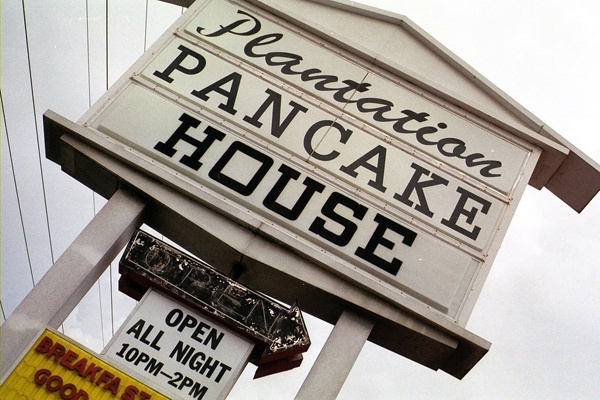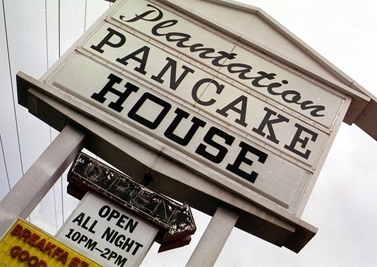
E
very February, without fail, I find myself driving a snow-lined Vermont road, my cold hands gripping the steering wheel, and lo and behold the familiar, plaintive strains of “Freebird” pour from the radio and stir my soul in a way I’m not entirely comfortable with. Those first bars, when the guitar is full of longing and wistfulness, so am I.
But in the back of my mind, I wonder what music I should allow myself to take pleasure in, if I should question what melody cues my homesickness, transports my imagination. Nostalgia is a spontaneous, intoxicating response for me, and the only way out is to turn the station. It’s in a writer’s nature to plumb discomfort and memory, and so I do.
Here are problematic things I once found beautiful: Abandoned plantation homes. The artfully landscaped, terraced graveyard in downtown Raleigh where Jesse Helms is buried and one frequently stumbles upon heartfelt Confederate re-enactments. A Nash County tobacco barn. A solemn hymn in a Baptist church. The dimly-lit ballroom of a country club with its buffet table of steaming omelets and Baked Alaska.
You don’t control the stimuli in your life as a child, and while I tried as a teenager, I know I did so with less worldliness and concern than I might have. So when I hear “If I leave here tomorrow, would you still remember me?” I ache a little for the hot summer nights in a South Carolina hayfield, where I sat on the hood of my boyfriend’s SUV, drinking beer, listening to this album when I was young, pretty, and occasionally stupid. And as the song reaches its frenzy—“Lord, I can’t change”—we are driving home with the windows down, pummelling the dashboard like a drum. My hair is flying across my face, and I can smell his cologne. His headlights land on the tawny body of a deer sprinting across the road. Everything inside me is wild, beautiful, beer-drenched.
Confession: When I get to this part in “Freebird” as an adult, sometimes I cry. What is it that moves me? The music itself, the frenzy, or memories of the out-of-reach girl it calls to?
A few years ago I went to a Budweiser-sponsored Skynyrd concert, a free one a few blocks away from my old house in downtown Raleigh, where I witnessed two women with strollers slap each other with half-hearted viciousness, one keeping a cigarette in her mouth, the other dropping her beer can with panache. The concert took place in Moore Square, where I imagine organizers had to coax out the homeless population that gathers there, as it’s near the shelter and bus station. I walked to the concert with both a faint interest in the music and anthropological intrigue about the people it gathered. I believe some part of me has always felt like I am not those people.
But of course I am those people. And so when nostalgia strikes, I feel as though an imaginary hand is reaching into the potting soil of my imagination, sifting and sifting until it rises, cupping something I’m made of, built from, fed on. Something that might not pass more enlightened scrutiny.
I recently watched a Lynyrd Skynyrd video online. It shows a field teeming with skinny white people in 1977, women in tank tops hoisted on shoulders, cheering on the original band performing in front of one of the largest Confederate flags I’ve ever seen, and ever since I’ve felt guilty about the way the music makes me feel, which is somewhere at the intersection of innocent and irresponsible. The song unlocks something in me.
But in the dead of winter, “Freebird” on, I deeply miss my neighborhood in Raleigh, the stained glass in my hallway, the sunny yellow of the forsythia that grew in my grandmother’s yard. I miss watching the big storms roll in at the beach, walking down the splintered pier over the churning Atlantic, peering at freshly-caught fish in gallon buckets. I want the leather of my driver’s seat to get so hot it burns my legs. I want to drink wine with my sister on her back porch, watch birds with my mother, talk with my father as he practices his golf swing in the driveway. I miss the swampy fecundity of the forests, creeks teeming with copperheads. I miss the people who “hug your neck,” and bring you casseroles and tell animated dinner table stories about drunk uncles on tricycles. I miss the effusive warmth of air and people, the mystery-laden nooks in old homes, the passion for good basketball. I could be happy there.
Everyone has a different South. I have many. But Southern nostalgia is like walking barefoot in the tea-colored creek I grew up near; you have to watch where you step. You have to think hard about what in your past is safe to love. Sometimes you have to find another station, another way in.
